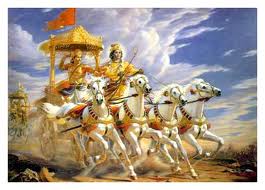Saturday, Dec 07, 2013. Srimad Bhagavadgeeta: Chapter-4 ( Jnana-karma-sanyasa-yogam). Slokam-23.
Saturday, Dec 07, 2013.
Srimad Bhagavadgeeta:
Chapter-4 ( Jnana-karma-sanyasa-yogam).
Slokam-23.
Gatasamgasya muktasya jnanavasthitacetasah,
Yajnayacaratah karma samagram pravileeyate.
Gatasamgasya = One who is detached from everything,
Mukatasya = Relieved from the intimate, emotional relationships ,
Jnanavasthitacetasah = Mind with complete devotion in thoughts of Atma,
Yajnaya acaratah = All karma done in the state of Yajnam
Pravileetate = Ends there.
Here the eligibility required to a Jnani, are narrated in this slokam. The route for the finite, is included in this narration. In the texts of Atmeeyam( scriptures) the words used where it is necessary ( controlled and calculated way), this is the natural procedure ( in the scriptures). Using limited words, meaningful, artistic; in these things, this slokam becomes a top example.
1. Gatasamgah :- One who left 'Samgam' ( attachment ). Ancient Rishies, whose divinity, is not by chance fall on them. This is already existing finite's reproduction only. Because of our attachment to worldly pleasures, we are fully involved and engaged in it. Where as Jnani ( Scholar who knows Atma ), totally discarded all attachments towards worldly pleasures.
2. Muktah :- Independent. ( Majority seekers have no clear idea of this independence. We are responsible for our attachments, and not others. The strong desire to worldly pleasures, made us get into the bounds, and no freedom from it ever. Jeevatma who thinks that finite is gained from the universal matters, thereafter greedily keep engaged with that. This way, bodily with outer world, and mentally with emotions, and intelligence part is connected with flood of thoughts. )
3. Jnanavasthitacetasah :- Mind is fully and firmly connected to Jnanam ( Knowledge of Atma). Attaining 'Mukta-vasta'( state of independence/ complete freedom), happens when finite detachment is achieved ( when cittam ( thoughts ) is firmly fixed in 'Nityaa-nitya-viveka-Jnanam).
One 'Jeevan-muktan' with his mind firmly fixed in Viveka-jnanam, discarding all attachments, and free from all pleasures, then continues his karma in the form of Yjnam. They never tie him in bonds. No new vasanas possible, they completely self-decayed.
The word 'Yajnam'here, used in the wider sense. All karma done without self-interest/ personal gains, for the benefit ( for the service ) of the world are called "Yajnam".
Thus Lord Krishna tells to Arjuna : 'which divine state of mind Jnani does his karmam'.
Hereafter 'in the next six slokams Lord tells about twelve types of Yajnas :- which are for all persons, in all opportunities, in all surroundings followed.




Comments